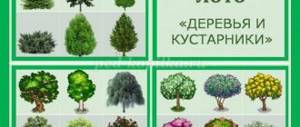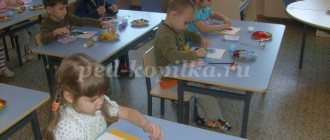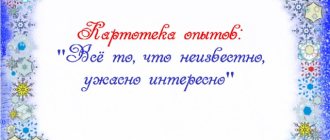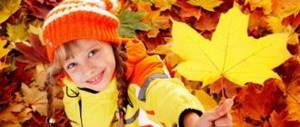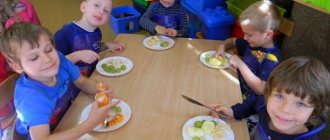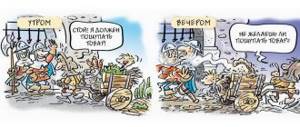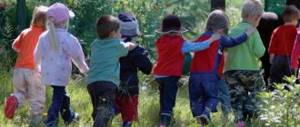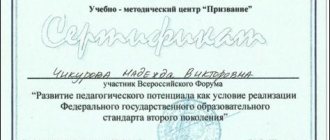Didactic materials on the topic: Autumn for kindergarten
Didactic material for consolidation on the lexical topic: “Autumn.”
Author: Meshcheryakova Svetlana Gennadievna, teacher - speech therapist MKOU Sh-I No. 8, Gremyachinsk, Perm region. Purpose: Generalization of students’ knowledge about the season - autumn. Objectives: Develop coherent speech, communication skills, auditory and visual attention, thinking; Improve the grammatical structure of speech; Cultivate curiosity. Description: It is known that good command of speech plays a significant role not only in everyday life, but also in a person’s professional activity. A person who is an interesting conversationalist and can effectively and clearly express his thoughts makes a more pleasant impression on others. Good command of your native language and speech is an art that needs to be learned. Why is it necessary to develop oral speech? - Be able to communicate with different people in different situations - Express your thoughts and feelings - Speak beautifully, correctly and pleasantly for listeners. Speech serves as a source of knowledge about the world around us, a means of communication and mutual understanding. In this regard, children’s ability to use speech becomes important. Every child feels the need to communicate. The need for communication is one of the most important in human life. When entering into relationships with the world around us, we communicate information about ourselves, in return we receive information that interests us, analyze it and plan our activities based on this analysis. And, of course, children want to be understood. Children often have difficulty describing people, objects, and phenomena. Even despite a sufficient vocabulary, most children do not know how to speak correctly, it is difficult for them to formulate their thoughts, they cannot fully participate in a conversation or conduct a dialogue. The formation of coherent speech is the main task of speech education. Good speech is an important condition for the development of a child’s personality. A didactic game is an excellent learning and development tool used in mastering any program material. Specially selected games and exercises make it possible to have a beneficial effect on all components of speech. In the game, the child gets the opportunity to enrich and consolidate vocabulary, form grammatical categories, develop coherent speech, expand knowledge about the world around him, develop verbal creativity, and develop communication skills. The proposed tasks are aimed at consolidating material on the lexical topic: “Autumn”. This is a kind of homework that is interesting to do with children after a speech therapy session at home, during a walk. The material will be useful to educators, primary school teachers, parents, and speech therapists. Assignment:
“Read, add, make sentences.”
Assignment:
“Place the words in order, make the correct sentence.”
Boots, rubber boots, footwear.
(Rubber boots are shoes)
Assignment:
“Favorite poems”
Listen to the poem.
Find offers. Read it expressively. In order to let children feel the beauty of the poetic word, an adult himself must feel it and be able to convey it in his performance.
You cannot read the work monotonously, inexpressively. Autumn.
The lingonberries are ripening. The days have become colder, And the cry of birds only makes my heart sadder. Flocks of birds fly away, away across the blue sea. All the trees shine in a multi-colored dress. The sun laughs less often, There is no incense in the flowers. Soon Autumn will wake up and cry awake.
Autumn.
A golden leaf is already covering the wet ground in the forest... I boldly trample with my foot the outer beauty of the forest. My cheeks are burning from the cold: I love to run in the forest, Hear the branches crack, Rake up the leaves with my foot!.. (A. N. Maikov)
Assignment: Read the poem. Come up with a name.
Task:
“Let’s clarify the signs”
Tell us what is typical for each autumn month? How is autumn different from summer?
Coordination of adjectives with nouns:
Task: Select epithets for the words: sun, sky, day, weather, trees, grass, animals, birds, insects.
Task: Find antonyms for the words: warm - cold, cloudy day - sunny day, dry - wet, long - short. Assignment:
“Say a tongue twister.”
First, say the tongue twister out loud slowly twice. Now to myself several times - at first slowly, then faster and faster. Learn to quickly pronounce tongue twisters out loud.
“All the maples have become red, And not a single one is teasing: Since everyone is red anyway, Who cares!”
Assignment:
“Learning to answer questions”
Depending on what task you set for the child, this is the answer you require: complete or short.
After reading the text, the answers can be full and meaningful. The question must be constructed competently and clearly so that the child is not distracted by extraneous details. Listen to the story.
Tell me, what time of year are we talking about? Look at the pictures, which one matches the story? It is important that the text read by adults is an example of the correct literary construction of a sentence, that it is bright and expressive.
Autumn
Autumn comes after summer. Gradually the days become cloudier, the sun shines less and less. The sky is covered with gray clouds. It often rains – long, drizzling rains. The leaves on the trees turn yellow and fall off. A cold wind tears leaves from tree branches, and they fall to the ground, covering it with a golden carpet. The grass is withering. It's damp and slushy outside. The birds don't sing anymore. They hide from the rain, gather in flocks and fly far to warmer climes. You can’t go outside without an umbrella, you’ll get wet. And it’s cold without a jacket and boots.
Multi-colored boats.
I came to the pond.
How many colorful boats are on the pond today: yellow, red, orange! They all arrived here by air. A boat will arrive, land on the water and immediately set sail. Many more will arrive today, and tomorrow, and the day after tomorrow. And then the boats will run out. And the pond will freeze. (D.N. Kaigorodov) Tell me what kind of boats float on the pond. What time of year do these boats happen? Color this picture and make up a story based on it. Share your impressions of autumn. Ask, how do you feel about autumn? Start your story with these words: I love autumn because... I don’t like autumn because...
Make up a story according to plan: “Day of Knowledge!”
Assignment: “What autumn gave us.” Words are helpers: garden, fruits, vegetables, vegetable garden, harvesting, harvest, mushrooms, baskets, forest, collect, ripened, harvest.
Game: “What grows in the garden?” Remember what grows in the garden. What grows in the garden? Look at the pictures, first name all the vegetables, then all the berries and finally all the fruits. Answer the questions and explain why there are several correct answers to the same question.
Game: “I cook myself” Show and name the vegetables from which borscht soup is made, and fruits for compote. We will cook borscht from... We will cook compote from...
Game: “I come up with a color” The names of some colors come from the names of words - objects. Let's come up with flower names together. Salad (what color?) – lettuce. Lingonberry (what color?) – lingonberry. Beetroot (what color?) – beetroot. Walnut (what color?) – nut. Carrots (what color?) – carrot. Plum (what color?) – plum. Game: “What kinds of juices are there?” What are these juices called? Apple juice – apple juice. Grape juice – grape juice. Carrot juice – carrot juice. Tomato juice – tomato juice. Cucumber juice – cucumber juice. Plum juice – plum juice. Cabbage juice – cabbage juice. Potato juice – potato juice. Cranberry juice - ... Pear juice - ... Assignment:
“Remember the proverb.”
Read the proverbs and explain how you understand them.
There is no turn from autumn to summer. Summer with sheaves, autumn with pies. In autumn, a gray morning, a red day.
Game: “What’s extra” Listen and guess which of the listed items is extra. Give a clear, complete answer. Start with these words: “I think I’m superfluous...” Chanterelle, porcini mushroom, fly agaric, boletus. Apple, pear, lemon, tomato. Sparrow, swallow, stork, heron, wagtail. Umbrella, jacket, hat, gloves, scarf. Provided you practice regularly, the results will not be long in coming.
We recommend watching:
Scenario for autumn fun in kindergarten. Middle-senior group Autumn phenomena in nature Autumn festival in a multi-age group of kindergarten Fairy tale about Autumn for children 5-7 years old
Similar articles:
Outdoor games for a walk in the younger group in the fall
Autumn festival in kindergarten. Scenario
Outdoor games for children of the preparatory group indoors
Morning exercises in the middle group. October
About the month of November for children
Gifts of autumn: notes on OD in the second junior group
Shagieva L.I. Gifts of autumn: synopsis of OD in the second junior group // Sovushka. 2020. N4 (18). URL: https://kssovushka.ru/zhurnal/18/ (date of access: 10.10.2020).
Order No. 506932
Goal: to consolidate children’s understanding of the gifts of autumn, to cultivate a love of nature.
Objectives: to activate the dictionary on lexical topics “Fruits”, “Vegetables”, “Mushrooms”, the ability to describe objects, notice characteristic features, find similarities and differences, improve the ability to write a short story, develop children’s imagination, memory, and emotionally respond to the general game.
Quiet music sounds, the teacher reads M. Geller’s poem “Hello Autumn!”
Hello, autumn!
Hello, autumn!
It's good that you came.
We are Autumn, we will ask you:
What did you bring as a gift?
Educator: Guys, what delicious gifts has autumn given us? (children remember fruits and vegetables).
Educator: Well done, guys! Do you know the benefits of vegetables and fruits? (children's answers)
Educator: Guys, I’ll tell you a story that happened to our vegetables and fruits. One day, the vegetables in the beds became very bored, and they decided to take a walk, but the fruits saw this and also went for a walk with them. And so our vegetables and fruits met, and played and had fun together all day. It's time to go home, but they forgot who's house is where!? Guys, can we help us find our fruits and vegetables?
Didactic game “Plant vegetables and fruits in your place.”
Educator: Well done, guys! Do you know the benefits of vegetables and fruits? (children's answers)
Educator: Guys, today you made me very happy with your knowledge about vegetables. You and I collected the harvest in the garden, and we also cleaned up everything in the garden. Now you can go for a walk in the forest. Do you agree? (Children's answers).
Educator: But guys, the forest is far away. We can't get there on foot. How can we get to the forest? Guess the riddle:
Two pedals, one steering wheel
We can ride on it. (bike)
Educator: In order to go, we need to pump up the tires. We got ready, took the pumps:
Shi - shi - shi - we will pump up the tires (lean forward).
Sha - sha - sha - we ride together, slowly (imitate riding a bicycle).
Sho-sho-sho - we had a good ride (we walked further through the forest, the children admired and rustled the leaves).
Educator: Guys, have you noticed that vegetables don’t grow in our forest? I wonder why? (children's answers).
Educator: Come on, let's look under the leaves. (children find mushrooms under the leaves and collect them).
Educator: Guys, what is this?
Educator: Is this fruit?
Educator: Are these vegetables? (these are mushrooms)
Educator: Guys, think about how mushrooms differ from fruits and vegetables? (children sit on the carpet and begin to look at the mushrooms).
D/I “Tell me according to the diagram”
Educator: Guys, we have collected a lot of mushrooms, but not all mushrooms can be eaten. Some mushrooms are called edible (the teacher shows edible mushrooms), while other mushrooms are inedible and cannot be eaten by humans. Here the boletus grows along the birch tree, it is an edible mushroom. Here is a porcini mushroom - the largest mushroom, edible. The most beautiful mushroom is the fly agaric, you should never touch it, it is poisonous to us. In the forest, guys, you can find a lot of edible and inedible mushrooms. Mushrooms can only be collected with adults, and mushrooms should never be touched without an adult. Not only our health, but also our lives depend on this. Now let's play a game.
Outdoor game “Collect mushrooms” (children with a teacher play the game).
Educator: Guys, what new did you learn today? (children's stories).
Educator: Did you guys like relaxing in our forest? (children's answers). But it's time to return home. Get on your bikes and let's ride back.
Game "Let's go home."
